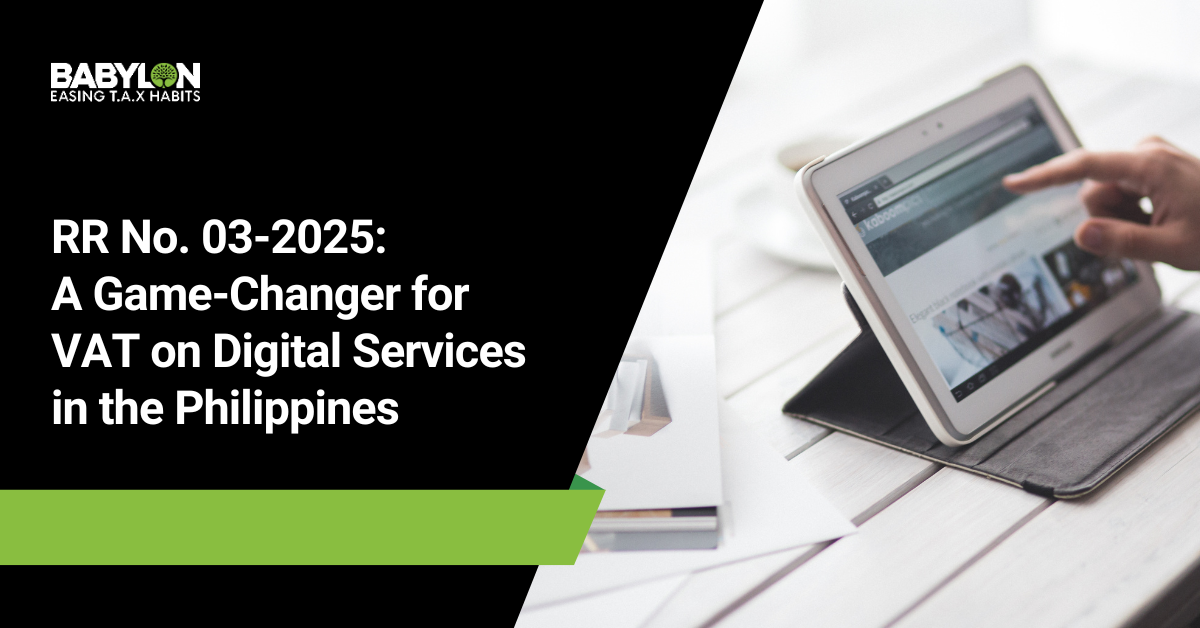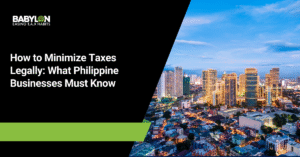Think back to the last time you streamed a show, downloaded an e-book, or subscribed to a cloud service. Taxes probably weren’t top of mind—but now, these digital activities carry new tax implications. In response, the Philippine government introduced Revenue Regulations No. 03-2025. This regulation aims to establish a fairer tax environment for digital services, ensuring both local and foreign providers compete on equal terms.
Why Was RR No. 03-2025 Introduced?
Before this regulation, the taxation of digital services in the Philippines was inconsistent, causing revenue losses and confusion for businesses and consumers alike. Foreign digital platforms, for example, weren’t required to collect VAT, giving them an unfair edge over local providers. This resulted in a skewed playing field and reduced government revenues.
What’s New Under RR No. 03-2025?
Here are the key updates:
- 12% VAT on Digital Services: All digital services consumed in the Philippines—whether from local or non-resident digital service providers (DSPs)—are now subject to a 12% VAT.
- Expanded Definition of Digital Services: Covered services include cloud storage, online ads, e-learning platforms, digital content (e.g., e-books, streaming, music), online gaming, digital marketing, and even virtual reality experiences.
- VAT Registration for Non-Resident DSPs: Foreign providers must register through the BIR’s dedicated online platform (VDS Portal) to ensure proper tax collection.
- Currency Conversion Rules: Transactions made in foreign currencies must be converted to Philippine Pesos using rates from official sources like the Banker’s Association of the Philippines (BAP).
- Exemptions: Educational services from accredited institutions, digital subscriptions for recognized schools, and digital services from banks or financial institutions remain exempt from VAT.
Who Benefits and How?
- Individual Consumers: More transparent pricing and better protection due to regulated digital transactions.
- Businesses: Clearer VAT obligations and a more level competitive field for local DSPs.
- Government Entities: Stronger revenue streams from the growing digital economy.
- Investors & Developers: Greater clarity and fairness in digital taxation, encouraging more investment in the sector.
Implementation and Compliance: What You Should Do
- Registration Deadline: DSPs must register or update their info with the BIR by April 1, 2025.
- VAT Collection Start Date: Collection begins on June 1, 2025.
- Penalties for Non-Compliance: Consequences include service shutdowns, blocked access, and penalties under the BIR’s RATE Program.
Next Steps for Businesses and Consumers
Understanding RR No. 03-2025 is essential. Businesses should evaluate their digital offerings, ensure proper VAT registration, and adjust pricing accordingly. Consumers should be aware of potential price adjustments and expect clear disclosures from service providers regarding VAT charges.
DISCLAIMER: This article is developed by subject matter experts at Babylon2k. This is for general information only and does not constitute expert advice. It is based on current regulations and may not account for all related topics. Any tax or compliance guidance provided cannot be used to avoid penalties or promote specific actions. Laws and interpretations may change over time, which could affect the accuracy of this report. We are not obligated to update this advisory if new regulations arise.
How We Can Help
Babylon2k’s B.E.T.H. can also help you when you need more information and clarification on how this law affects your business. Learn More >
☎️ Get in Touch!
- Request a Free Consultation | Request Consult
- Message us on Viber/ Whatsapp Number @ +63-927-945-3382.
- Email us directly at [email protected]
RESOURCES
RR No. 3-2025 OCR | View here.






